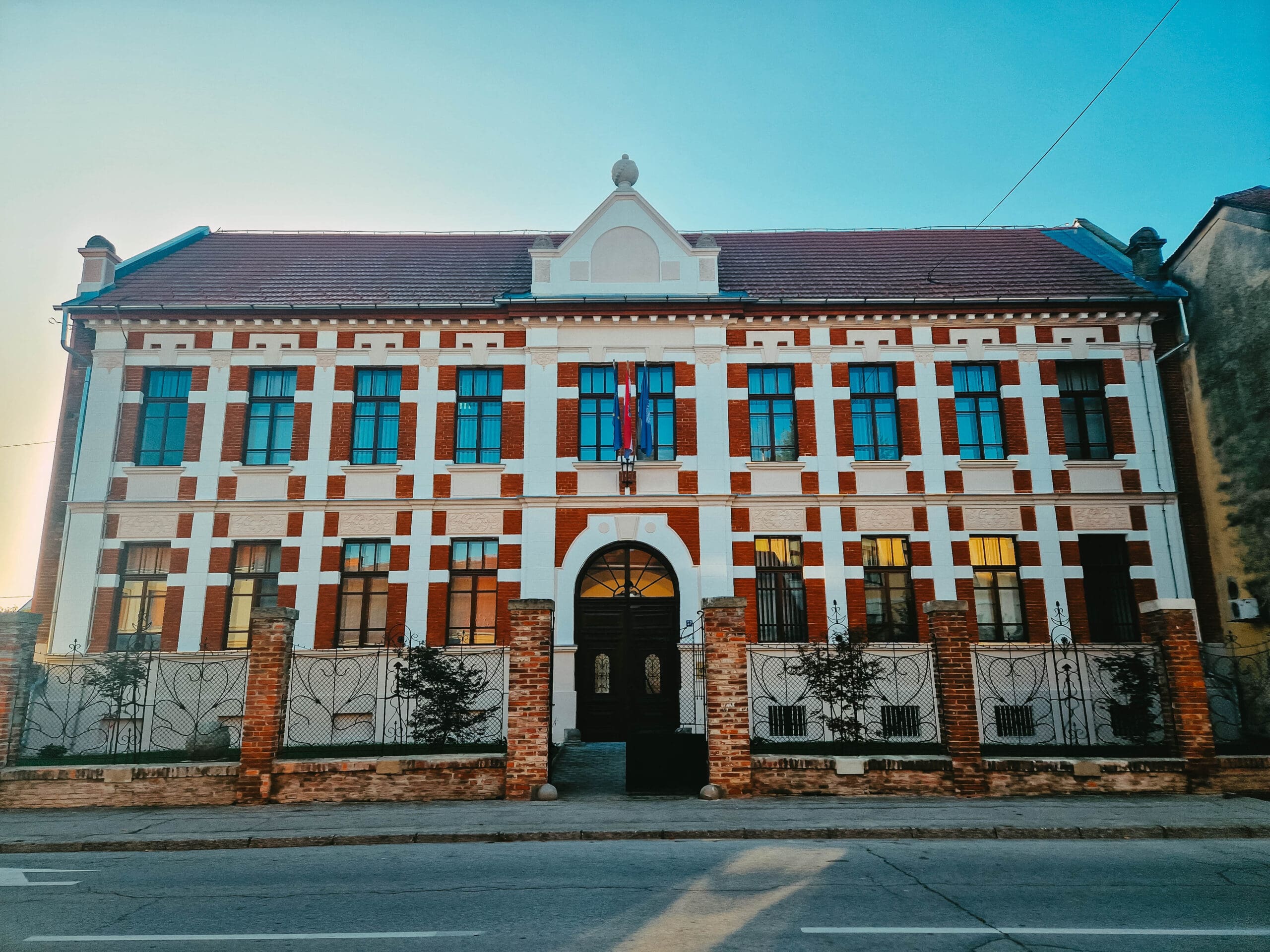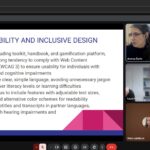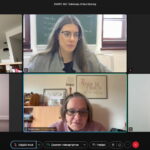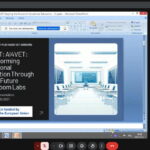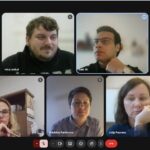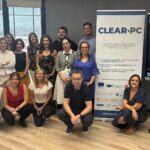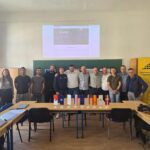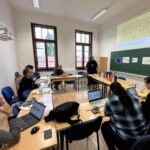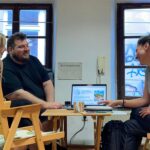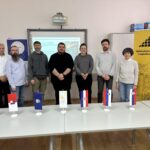Implementation of five new European projects in education and health has begun
In recent months, the Public Open University Čakovec (POU Čakovec) has been approved to implement five international projects co-financed by the Erasmus+ programme (4 cooperative partnerships in adult education and vocational education) and EU4Health (1 project). The projects cover the areas of adult education, vocational education, sustainable development, artificial intelligence, and health literacy. Their total value amounts to 2,926,253.29 euros, and POU Čakovec is participating as either the applicant or a partner, confirming its continuous contribution to the development of educational and social innovations in the local and European community. The share of POU Čakovec in all projects currently being implemented and those starting in the autumn amounts to 440,366.42 euros.
GamifiedEd: Gamification in Adult Education
The “GamifiedEd: Gamification in Adult Education” project is focused on modernising adult education by applying gamification methods, which include game elements in the educational process, and by using innovative digital tools. The main goal of the project is to strengthen the competencies of adult education lecturers to make learning more accessible, flexible, and motivating for all participants. The project will enable the development of comprehensive, free, and easily accessible resources for lecturers, including a digital manual with gamification methods, an online platform for creating gamified content, and a practical Toolkit for the simple and effective application of gamification in teaching. The project is co-financed by the Erasmus+ programme under the KA220-ADU activity and will be implemented from November 3, 2025, to November 2, 2027. The total value of the project is 120,000.00 euros. The partners are Žilinská univerzita v Žiline (Slovakia), Kayros Digital Innovation (Spain), and Ljudska univerza Lendava (Slovenia), with the Open University Čakovec as the project applicant and lead partner. The project was approved with the highest number of points in that call within adult education.
Through a recently held first online meeting, the partner consortium is already preparing for the start of the project implementation.
In November, the Open University Čakovec will host the first transnational in-person meeting in Čakovec, welcoming all project partners.
SMART AGE – Seniors’ Media Awareness & Resilience in the Digital Age
The goal of the SMART AGE project is to improve media literacy and digital resilience among older people, with a special emphasis on those in rural areas, to respond to the challenges of disinformation and content generated by artificial intelligence. The main goal is to equip older participants with the key skills needed to navigate the digital space confidently and safely. To achieve this, the project will develop a comprehensive curriculum based on micro-credentials, aligned with the DigComp 2.2 digital competence framework, which will focus on topics such as fact-checking, recognising algorithmic bias, and digital privacy. The project will be implemented within the Erasmus+ programme, key activity KA220-ADU, from December 1, 2025, to November 30, 2027, with a total budget of 250,000.00 euros. The project holder is Bildungshaus Retzhof GmbH (Austria), and the partners are Open University Čakovec, Ljudska univerza Ormož (Slovenia), and Institut für Demokratiepädagogik – VoG (Belgium). The initial online meeting is scheduled for December 2025, and an international in-person meeting will be held in January 2026 in Čakovec.
AI4VET – Transforming Vocational Education Through AI and Future Classroom Labs
Classroom innovations will be covered by the AI4VET – Transforming Vocational Education Through AI and Future Classroom Labs project, which aims to address significant challenges in European vocational education and training (VET), such as skill mismatch and the need for inclusive, personalised education, by empowering teachers and learners through the integration of artificial intelligence (AI) and innovative Future Classroom Labs (FCL). To achieve this, the project will create a comprehensive set of practical tools and resources, including an AI-enhanced VET Framework with a training programme for teachers and a curated AI tools navigator, and other tools. The project is part of the Erasmus+ programme under key activity KA220-VET – Cooperative Partnership in Vocational Education. The total value of the project is 250,000.00 euros, and the project duration is from November 1, 2025, to October 31, 2027. The project holder is Sysco Polska from Poland, while the partners are Open University Čakovec (Croatia), Acceleras (Austria), Kaunas Science and Technology Park (Lithuania), and Bucovina Institute (Romania). POU Čakovec is participating as a partner with a share of 37,000.00 euros.
X-VET – Experiential Sustainability Education for VET Learners
In the field of sustainability and digital transition in vocational education, the project X-VET – Experiential Sustainability Education for VET Learners has been approved. The X-VET project responds to the urgent need for vocational education and training (VET) institutions to adapt to the dual green and digital transitions, equipping them, along with their teachers and learners, with the necessary tools for the transformation towards sustainability. The project’s goal is to integrate experiential entrepreneurship and digital innovations into VET practices through a holistic, organisation-wide approach. Key results will include a comprehensive sustainability manual providing a 10-step model for embedding sustainability into institutional management and curricula; a comprehensive online course on sustainability with tailored learning pathways for managers, teachers, and learners in VET; and a framework for integrated sustainability hackathons to foster collaborative solving of real-world problems. The project is implemented through the Erasmus+ programme under key activity KA220-VET. It will be implemented from November 1, 2025, to October 31, 2028, and its total value is 400,000.00 euros. The project holder is Werkstatt-Berufskolleg Unna from Germany. Along with Open University Čakovec as a partner, the consortium also includes Acceleras (Austria), SIA Hotel School (Latvia), ICEP – Institute of European Certification of Personnel (Slovakia), Technical School Pirot (Serbia), and Ilmiofuturo (Italy).
CLEAR-PC – Cancer Literacy Education and Awareness Resources for Prostate Care
The largest project among the currently active initiatives is CLEAR-PC – Cancer Literacy Education and Awareness Resources for Prostate Care, which focuses on improving health literacy related to the prevention and care for prostate cancer patients. The CLEAR-PC project addresses the key problem of low health literacy in prostate cancer prevention and care, recognising that inadequate literacy leads to difficulties in understanding complex medical information, limits shared decision-making, and increases health inequalities. Given the high prevalence and complexity of prostate cancer, the goal of the CLEAR-PC project is to design and develop a comprehensive strategy to improve (digital) health literacy in prostate cancer prevention and care, taking into account individual abilities, the role of healthcare professionals and organisations, and the impact of social and cultural contexts. The project is implemented within the EU4Health programme, in the period from October 1, 2025, to September 30, 2028, with a total budget of 1,247,563.29 euros, of which the European Union co-finances 998,050.64 euros. The project holder is Universidad Miguel Hernández de Elche from Spain, and partners include Universidad de Murcia, Servicio Canario de la Salud, Fundación para el Fomento en Asturias de la Investigación Científica y la Tecnología, and FEFOC Fundació Privada Jordi Estapé from Spain, Ordem dos Psicólogos Portugueses (Portugal), Thomas More Mechelen-Antwerpen (Belgium), Erasmus Universitair Medisch Centrum Rotterdam (Netherlands), CSI Center for Social Innovation LTD (Cyprus), and Open University Čakovec (Croatia). The first international consortium meeting was held in October at the Spanish project holder’s premises, where the partners met in person for the first time and successfully agreed on future steps in the project’s realisation.
Projects currently being implemented:
FCL4VET – Advancing Vocational Education through Future Class Labs (FCL) Implementation
The project “Advancing Vocational Education through Future Class Labs (FCL) Implementation”, abbreviated FCL4VET, is being implemented within the Erasmus+ programme under key activity KA220-VET – Cooperative Partnership in Vocational Education, and the total value of the project is 250,000.00 euros. The project runs from December 31, 2024, to December 30, 2026, and its applicant is Centrum Kształcenia Zawodowego w Wysokiem Mazowieckiem from Poland. The project partners come from different European countries: from Croatia, Open University Čakovec; from Spain, Kayros Digital Innovation and IES Pablo De Olavide La Carolina; from Denmark, CELF – Center for Erhvervsrettede uddannelser Lolland-Falster; and from Cyprus, ViModo – Research & Education Hub. The project’s goal is to improve vocational education by introducing the Future Classroom Labs (FCL) concept, which combines modern technologies such as artificial intelligence (AI), large language models (e.g., ChatGPT), virtual and augmented reality (VR/AR), and 3D printing. The project promotes the HyFlex learning model, which allows students to participate in classes in-person, online, or in a combination of both approaches, thereby increasing flexibility, engagement, and accessibility, especially for students with special needs. FCL will be based on six key learning zones – research, discovery, interaction, development, creation, and presentation – with the aim of fostering active, personalised, and inclusive student-centred education.
MC Chef: Microcredential Kitchen Basics for Gastronomy
The project “Microcredential Kitchen Basics for Gastronomy”, with the acronym MC Chef, is being implemented as part of the Erasmus+ programme, under key activity KA220-VET – Cooperative Partnership in Vocational Education, and its total value is 250,000.00 euros. The project runs from November 1, 2024, to December 31, 2026, and the project holder is KAOS Bildungsservice gGmbH from Austria. Four partners from different European countries are participating in the project: Open University Čakovec from Croatia, and Consultoría de Innovación Social and Maude Studio S.L. from Spain. The main goal of the MC CHEF project is to develop digital educational content and micro-credentials in basic culinary skills to address the growing shortage of qualified staff in the hospitality sector. Through curriculum development, online courses, and testing them in real working conditions, the project aims to provide flexible and market-relevant education that will increase the employability and mobility of the workforce across Europe. Special emphasis is placed on including vulnerable groups, promoting sustainable practices in gastronomy, and connecting educational institutions with employers, thereby strengthening the relevance of vocational education and training in this sector. The project results will be available in multiple languages and freely accessible to users across Europe.
InclusiGardens: Digital and Sustainable Pathways to Social Inclusion through Urban Gardening
The project “InclusiGardens: Digital and Sustainable Pathways to Social Inclusion through Urban Gardening”, known by the acronym InclusiGardens, is financed as part of the Erasmus+ programme, through key activity KA210-ADU – Small-scale partnership in adult education, with a total budget of 60,000.00 euros. The project runs from December 1, 2024, to May 31, 2026, and the project holder is the Permaculture Association of Slovenia. Three partners from different European countries are participating in the project: Open University Čakovec from Croatia and eVRgreen Studio from the Netherlands. Each organisation brings its professional expertise, from sustainable education and working with vulnerable groups to digital tools and gamification in learning. The goal of the InclusiGardens project is to empower at-risk and marginalised urban groups, such as the unemployed and people with low incomes, by developing sustainable micro-gardening skills and promoting self-sufficiency. Through a series of activities, including the creation of an e-manual, a zero-waste cookbook, a curriculum, and gamification strategies, the project will create digital educational resources that will be freely available to everyone via a specially developed web portal. The project emphasises social inclusion, food security, and sustainable development, and plans to achieve its goals through focus groups, pilot workshops, and expert round tables. In this way, InclusiGardens not only teaches practical skills but also builds community and contributes to a better quality of life for the most vulnerable urban residents.
HER[AI]TAGE: Preserving Intangible Cultural Heritage and Environmental Knowledge Through AI Technology
The project “HER[AI]TAGE: Preserving Intangible Cultural Heritage and Environmental Knowledge Through AI Technology”, abbreviated HER[AI]TAGE, is being implemented within the Erasmus+ programme through activity KA210–ADU – Small-scale partnership in adult education, with a total budget of 60,000.00 euros. The project runs from February 1, 2025, to July 31, 2026, and the project holder is the Association for media promotion of culture, heritage, tradition, and art – Kultivator from Croatia. Three organisations are participating in the partnership: Open University Čakovec (Croatia), Croatian Cultural Society Pomurje (Slovenia), and the City Library in Novi Sad (Serbia). Together, these institutions are working on preserving intangible cultural heritage and ecological knowledge through the application of artificial intelligence (AI) in adult education. HER[AI]TAGE focuses on collecting and digitally archiving oral stories from older community members, especially those related to the Mura, Drava, and Danube rivers, and local natural environments in the three countries. Through AI-generated illustrations, virtual exhibitions, and a digital collection, the project combines traditional knowledge with modern technology, creating innovative tools for intergenerational learning. The project also strengthens the capacities of adult educators in the ethical and creative application of AI tools and creates open digital resources for the wider public. The target group is primarily older people as bearers of knowledge and stories, but also educators, local communities, and everyone interested in preserving cultural heritage and lifelong learning. HER[AI]TAGE thus shows how artificial intelligence can have a socially useful and culturally sensitive application, strengthening the connection between people, nature, and shared European heritage.
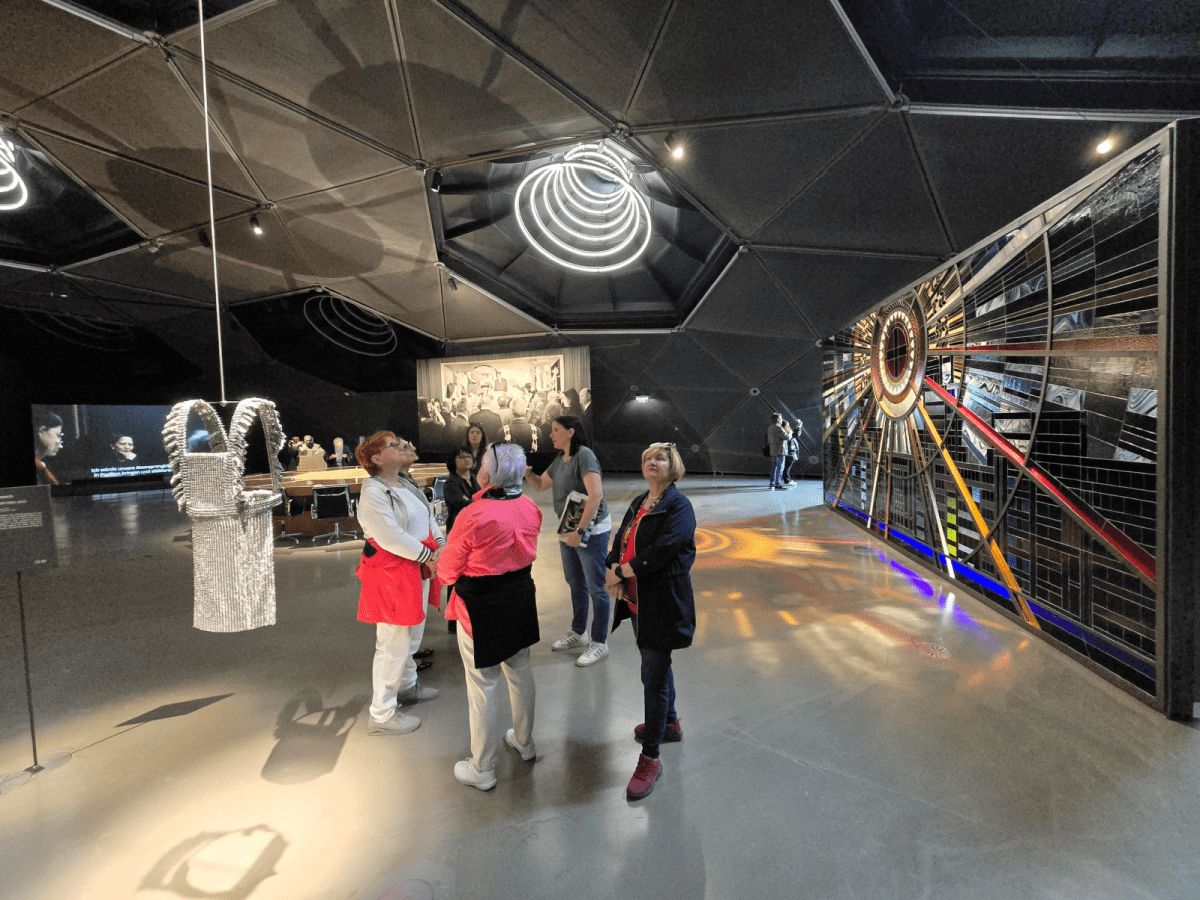 Erasmus+ Accreditation in Adult Education
Erasmus+ Accreditation in Adult Education
The Open University Čakovec is a proud holder of the Erasmus+ Accreditation in adult education for the period until 2027. This accreditation represents a prestigious recognition from the European Union awarded to educational institutions that have demonstrated high-quality standards in implementing the Erasmus+ programme, and its award confirms institutional excellence and a strategic focus on long-term development in adult education.
The Erasmus Accreditation provides us with easier and regular access to funding from the Erasmus+ programme, thereby ensuring stable support for implementing international projects and mobility activities. It is particularly significant that the accreditation was awarded specifically in the field of adult education, which emphasises our commitment to providing high-quality, relevant, and contemporary educational programmes that are in line with European standards and best practices in adult education.
Within the scope of the accreditation, we are actively implementing mobility activities for our teachers and collaborators, who gain new knowledge and skills through professional visits and training abroad, which they then apply in their daily work with participants. In this way, we improve the quality of teaching, introduce new working methods, and ensure that our educational programme remains in step with European trends.
Adult learners are also included in mobility activities, having the opportunity to attend education programmes in adult education institutions operating in one of the European countries. Erasmus+ is the European Union’s largest programme for education and training, youth, and sport, which has been enriching lives and broadening horizons for millions of citizens of all generations for almost 40 years.
The Erasmus+ Accreditation for adult education is not just recognition for past work, but also a strategic opportunity for further development, strengthening European partnerships, and empowering adult education as a key tool for lifelong learning, employability, and social inclusion.
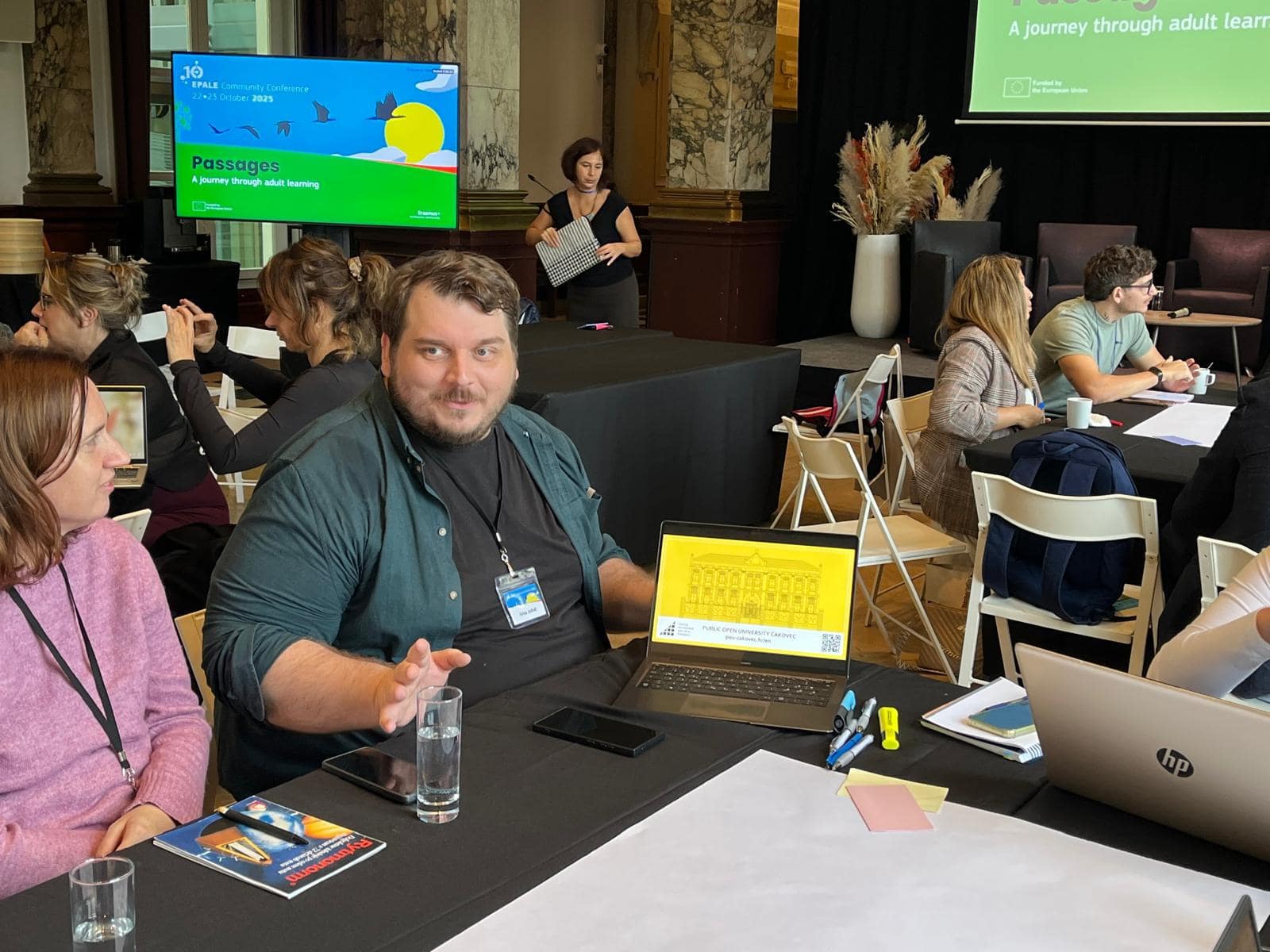 EPALE COMMUNITY CONFERENCE IN BRUSSELS
EPALE COMMUNITY CONFERENCE IN BRUSSELS
Last month, our Ivica Jeđud, head of institutional and inter-organisational cooperation, had the opportunity to participate in the conference of the e-Platform for Adult Learning in Europe (EPALE). EPALE is celebrating its 10th anniversary this year and brings together more than 170,000 people from the adult education sector and over 100,000 users who use this e-platform every month. The EPALE community conference celebrated past achievements and looked towards the future of adult education, bringing together practitioners, policymakers, researchers, and innovators from all over Europe. Through a series of activities – from round tables and plenary lectures to interactive workshops – three key themes were covered that will define EPALE’s thematic focuses for 2025: artificial intelligence and its transformative impact on educational processes, basic skills as the foundation of lifelong learning, and the development of future-oriented skills to prepare learners for the opportunities of tomorrow.
We thank the Agency for Vocational Education and Adult Education, which acts as the national support service for the EPALE platform in the Republic of Croatia (EPALE – Adult Learning in Croatia), for the invitation and the opportunity to participate in this event. We look forward to the next opportunities for networking, learning, and exchanging experiences!
Public Open University Čakovec continues with the development and implementation of European projects
With these projects, the Open University Čakovec further strengthens its position as a relevant educational and developmental institution at the European level, contributing to the development of the local community through innovative approaches to learning, sustainability, and health improvement. Alongside the projects already in implementation, the Open University Čakovec is continuously working on applying for new project proposals in collaboration with international partners, listening to the community’s needs and following the guidelines of European policies. Projects are not just added value to everyday work; they are the way modern education is shaped, professional growth is encouraged, and participants are provided with education that is high-quality, current, and connected to the needs of the market and society. Follow us and stay up to date with the university’s news and current events.

Funded by the European Union. Views and opinions expressed are however those of the author(s) only and do not necessarily reflect those of the European Union or Agency for Mobility and EU Programmes (AMPEU). Neither the European Union nor the granting authority can be held responsible for them.

